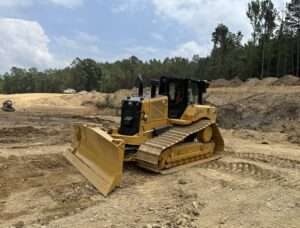California Senate Bill 156: Navigating New Regulatory Challenges
Date: Dec 06, 2024
In July 2024, California enacted Senate Bill 156 (SB 156), revising hazardous waste management regulations. A key change is the increased Generation and Handling (G&H) Fee, now set at $49.25 per ton for developers generating five or more tons of hazardous waste annually. The first five tons of hazardous waste generated and disposed of offsite are now also subject to this fee, increasing costs for developers involved in the redevelopment of environmentally impacted sites.
With rising fees and penalties for non-compliance, developers face greater operational and administrative burdens. However, ENTACT offers alternatives to traditional excavation and disposal, helping mitigate these costs and reduce environmental impact. ENTACT’s in-situ stabilization (ISS) and ex-situ treatment approaches provide innovative, on-site solutions for remediating contaminated soils and groundwater, offering significant benefits over conventional dig and haul methods.
THE BENEFITS OF ISS TECHNOLOGY FOR DEVELOPERS
Cost Savings
ISS reduces costs by significantly reducing the amount of contaminated soil needed to be transferred to disposal facilities. Stabilizing soil in place avoids disposal fees, handling, and transportation costs, making it an especially cost-effective option for urban and brownfield projects where disposal fees can be substantial. ISS also serves as a ground improvement technique, addressing geotechnical challenges like liquefaction and soft soil settlement, ideal for California’s brownfield redevelopments.
Environmental Impact
ISS minimizes the environmental footprint by reducing transportation, which lowers emissions and supports California’s environmental goals. It also promotes sustainability by allowing treated soil to be reused, reducing resource consumption and supporting a circular economy.
Reduced Risk & Liability
ISS minimizes risk by treating contaminants onsite, avoiding the dangers of transporting hazardous materials. This reduces exposure to workers and surrounding communities, limits liability to the property, and mitigates long-term risks and potential litigation.
THE BENEFITS OF REMEDIAL TREATMENT APPROACHES FOR DEVELOPERS
Remedial treatment options, such as onsite treatments that reduce the classification of soil as hazardous, offer developers a strategic advantage in controlling costs and navigating regulatory complexity. By treating contaminated materials either in-situ or in designated treatment units, developers can often avoid the high disposal fees associated with hazardous waste. Once treated, the material can be returned to the site or transported offsite if non-hazardous, significantly reducing costs and environmental impact.
ENTACT’s experienced team works closely with developers to design tailored remedial approaches that meet regulatory requirements and remediation goals, ensuring efficient and cost-effective solutions.
A PROVEN PARTNER IN GROUND IMPROVEMENT & REMEDIATION
ENTACT’s expertise in environmental remediation and geotechnical construction positions us as a trusted partner for even the most challenging development projects. With hundreds of high-profile redevelopment sites completed across the nation, we have earned a reputation for reliability, cost control, and accountability.
As an industry leader in ground improvement, ENTACT has successfully performed over 15 million cubic yards of shallow and deep soil mixing, more than all other national contractors combined. Our proficiency in ISS technology ensures we deliver innovative, cost-effective, and environmentally responsible solutions.
Choosing ENTACT’s ISS services helps developers stay ahead in a changing regulatory landscape, reduce costs, improve sustainability, and manage risks—ensuring projects move forward smoothly and efficiently.


